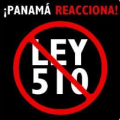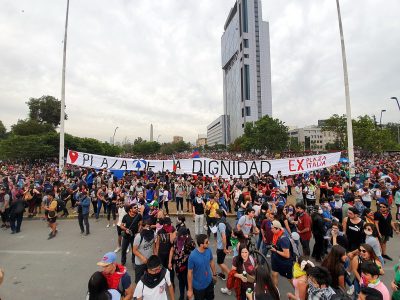This Latin America and the Caribbean Netizen Report was researched, written, and edited by Juan Arellano, Renata Avila, Ellery Biddle, Lully Posada, Elizabeth Rivera, Firuzeh Shokooh Valle, and Silvia Viñas.
[All links lead to Spanish-language websites unless otherwise noted]
During the 20th-century, free trade agreements – mainly with the United States – brought about profound changes to the economic and political reality of many Latin American countries. In more recent years, such agreements have posed new challenges in the digital age. In Colombia, Chile, and Costa Rica, non-governmental leaders have worked to lessen the effects of treaties that aim to combat piracy and protect intellectual property, but that frequently prevent Internet users from innovating and exchanging information in creative ways.
Two weeks ago, the latest wave of free trade agreements proposed by the United States arrived in Panama, where the Congress approved a law that will impose severe penalties for violating copyright and will make it almost impossible for the accused to be able to present their cases in court.
Access to information
The Congress of Panamaapproved a copyright bill on September 27, that could restrict the freedom of speech and access to information

Image used for Ley 510 protest, shared on social networks.
online. #Ley510 [Law 510] is the hashtag under which netizens are discussing the bill and making their frustrations known. The law would create an administrative body, the Copyright Directorate General, and bestows on it the power to accuse people of copyright infringement without due process of law and to impose fines of up to 100,000 US dollars, based on only the suspicion of an infraction. Here is a video of an interview with more details about the bill and an analysis of its detrimental effects on the rights of the users. Various organizations, non-profits, and members of the Latin American and international academic world have sent an open letter to President Ricardo Martinelli urging him to abstain from signing the bill, which they refer to as the “worst copyright law in history.” Read user reactions to the bill in a post [en] by Ariel Moreno for Global Voices.
Civil society groups in Colombia are supporting Senator Camilo Romero as he leads a constitutional challenge to Law 1520 (Law Lleras 2.0), a stringent copyright law that was hastily approved by Colombia's Congress in the spring of 2012 in order to comply with the nation's free trade agreement with the United States. The Karisma Foundation, the Foundation for a Free Press (FLIP), and the constitutional law department at the Our Lady of the Rosary University, with mention of the collective RedPaTodos (the Net For Everyone), presented two Citizen Interventions as support for the constitutional lawsuit of Senator Romero. The groups took advantage of the the Constitutional Court's invitation for appearances in the legal process over the law. This is considered a civil success and an important step. Take a look at communications 1 and 2.
In Argentina, already strict intellectual property laws could become even more so if Congress passes a bill that would make violations of the law punishable with jail time. The blog Partido Pirata (Pirate Party) wrote that the bill will only serve to fill Argentinian prisons with copyright infringers. Activist Beatriz Busaniche commented on the issue.
Censorship
Fabio Jose Silva Coelho, the head of Google's operations in Brazil, was arrested [en] for failing to comply with a government order to take down supposedly defamatory videos on YouTube, which Google owns. In the videos, Alcides Bernal, a candidate for mayor in the upcoming elections in Campo Grande, is criticized. In Brazil, public defamation of candidates is against the law during the month prior to elections. Silva was released two days after his arrest.
In Paraguay, without a judge's order, two Internet Service Providers (ISPs) blocked the website Abcolor.me, which satirizes the daily publication ABColor [en]. Users criticized the decision, calling the block an affront to net neutrality and a violation of free speech. Subsequently, the providers unblocked the site.
In Ecuador, netizens have reacted with surprise at the recent communique that the country's president directed to the daily El Comercio. Signed by the national communications secretary, it asserts the government's right to request the personal data of readers whose online comments are considered defamatory, offensive, or harmful, without regard to relevant legal action. Faced with this assertion of power, the publication has opted to shut down the option of commenting on its digital edition.
Cybersecurity
The Ministry of Defense in Colombia completed a cybersecurity crisis management exercise at the University of the Andes in Bogotá. With the support of the Organization of American States, authorities used tools and technologies donated by the United States Department of State with the aim of “reinforcing the ability of the Colombian state to prevent, detect, and mitigate the effects of a large-scale cyber attack in the country.”
Harassment
In Mexico, the blogger and creator of the popular El Santuario (The Sanctuary) website, Ruy Salgado, disappeared on September 8 after finishing a broadcast of his program on the blog. The next day, he was expected to attend a meeting with former presidential candidate, Andrés Manuel López Obrador, in the center of Mexico City, but he never showed up [en].
Salgado is known for his support for López Obrador and the #YoSoy132 [en] movement. His blog reported the controversial elections on July 1 and specialized in covering cases of corruption within government institutions. Several of those who collaborated with the blog work in said institutions and are witnesses to the corruption. They report for the site anonymously, in order to protect themselves. Many Twitter users reported [en] that Salgado had received threats. In its third statement on September 17, the blog presented all the details of Salgado's disappearance and announced that the blog would suspend all activity until he reappeared. More on Animal Politico and Index on Censorship [en].
Police officers in Baja California, Mexico arrested supporters of the #YoSoy132 movement during a protest, as well as journalists and photographers [en] who were documenting the event. According to a report from Article 19, an organization that promotes freedom of expression, two cameramen from local television stations were detained and their recordings were destroyed by police before their release.
In Cuba, the well-known blogger Orlando Luis Pardo Lazo was arrested [en] by authorities on the morning of September 1. Later that day, Pardo Lazo was supposed to moderate part of the independent intellectual forum Estado de SATS [en], to which the public is invited to share ideas and debate the political and social future of the island. The forum was canceled in light of his arrest, but went ahead a few days later despite intimidation by police of various participants. Pardo Lazo was released the next day.
Acclaimed blogger Yoani Sanchez was arrested and detained by police in the eastern province of Bayamo last week when she attempted to attend the trial of Spanish national Angel Carromero, who has been accused of vehicular manslaughter in the death of human rights advocate Oswaldo Paya. Arrested and detained with Sanchez were blogger Agustin Diaz and Reinaldo Escobar, Sanchez's husband, who is also a blogger and citizen journalist. All three were held for approximately 30 hours, transported to Havana, and then released. On Twitter, Cuban netizens reported that three other bloggers attempting to cover the trial, including Henry Constantin, were arrested and detained briefly.
In Venezuela, the pro-government hacker group N33 continues to use social media [en] to threaten journalists [en] who are critical of Hugo Chávez's administration. Members of the group periodically attack the Twitter accounts [en] of these journalists and use the accounts to send unkind messages to their followers, in addition to messages in support of President Chávez.
Privacy and personal information
In Brazil, Facebook will pay damages [pt] of more than two million dollars to a Brazilian model, for violation of her rights to honor and privacy stemming from the wrongful use of her image. The model, whose name has been withheld from press reports for privacy reasons, claims that a third party used her image and personal information to create a fake profile on the social networking site.
In Peru, discussions continue over a computer crimes bill that, in the opinion of many such as attorney Erick Iriarte, violates basic constitutional rights.
Peruvian journalist Rudy Palma was imprisoned, accused of computer crimes for hacking into the email accounts of government workers [en], and was also fired from his job at the daily publication Peru21. In July, he was released under house arrest.
Internet governance
From September 24-26, the fifth regional preparatory meeting [en] of the Internet Governance Forum (IGF) was held in Bogotá, Colombia ahead of the global IGF which will be held in November in Baku, Azerbaijan. The IGF is dedicated to fostering political dialogue between governments, the private sector, the technology sector, academia, and non-profits, and to inform members of the region on issues and trends in Internet policymaking.
Recent analysis
The Electronic Frontier Foundation (EFF) published a new report [en] about digital privacy activism in Latin America, in which they highlighted various groups that work to defend digital rights in their countries and regions. The report offers an excellent summary of the most active NGOs in this field in Latin America.
In addition, EFF published an analysis [en] of how new measures and legislation in the area of copyright pose a threat to Internet users in Colombia and Panama.
The recently published manual ‘Creative Commons, a guide for users‘ offers theoretical information and practical suggestions on Creative Commons licenses for users, in Spanish.
Much of the research that the Center for Studies of Free Speech and Information Access (CELE) at the University of Palermo in Argentina completes is available on its website. One of its recent publications, ‘Slander and defamation: two years of Argentinian Penal Code reform,’ evaluates the effects of the 2009 Law 26.551, which “allowed the decriminalization of slander and defamation in Argentina,” two years after its implementation.
Sovereigns of the Internet
In Argentina, the Fundación Vía Libre organized a workshop on secure communications and open software for journalists and activists interested in protecting the privacy of their communications online. The workshop was part of a global series [en] of events dedicated to secure communications as part of the movement “Freedom without Fear.”
In Colombia, the organization Active Internet started a free online seminar about cyberactivism, which began September 27 and will run until February 2013. It is a project by the Fundación Karisma (with sponsorship from Google Colombia and support from RedPaTodos.) Global Voices published an update and a post [en].
Infographics
- You are not safe online!: Published originally on the blog Compliance and Safety [en].
- 10 things that we shouldn't be stopped from doing because of copyright: NGO Derechos Digitales (Digital Rights).
Subscribe to receive the Global Netizen Report by email
For upcoming events related to the future of citizen rights in the digital age, see the Global Voices Events Calendar.





1 comment